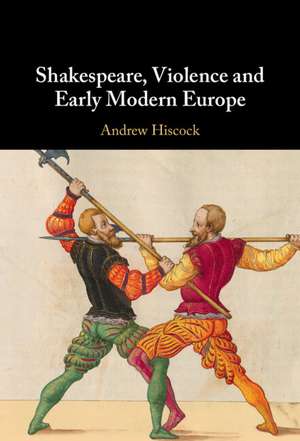Shakespeare, Violence and Early Modern Europe
Autor Andrew Hiscocken Limba Engleză Hardback – 16 feb 2022
| Toate formatele și edițiile | Preț | Express |
|---|---|---|
| Paperback (1) | 205.24 lei 6-8 săpt. | |
| Cambridge University Press – 21 dec 2023 | 205.24 lei 6-8 săpt. | |
| Hardback (1) | 530.32 lei 3-5 săpt. | +24.88 lei 7-13 zile |
| Cambridge University Press – 16 feb 2022 | 530.32 lei 3-5 săpt. | +24.88 lei 7-13 zile |
Preț: 530.32 lei
Preț vechi: 576.44 lei
-8% Nou
Puncte Express: 795
Preț estimativ în valută:
101.48€ • 104.85$ • 84.42£
101.48€ • 104.85$ • 84.42£
Carte disponibilă
Livrare economică 26 februarie-12 martie
Livrare express 12-18 februarie pentru 34.87 lei
Preluare comenzi: 021 569.72.76
Specificații
ISBN-13: 9781108830188
ISBN-10: 1108830188
Pagini: 290
Dimensiuni: 158 x 235 x 20 mm
Greutate: 0.57 kg
Ediția:Nouă
Editura: Cambridge University Press
Colecția Cambridge University Press
Locul publicării:Cambridge, United Kingdom
ISBN-10: 1108830188
Pagini: 290
Dimensiuni: 158 x 235 x 20 mm
Greutate: 0.57 kg
Ediția:Nouă
Editura: Cambridge University Press
Colecția Cambridge University Press
Locul publicării:Cambridge, United Kingdom
Cuprins
1. 'touching violence or punishments': Walter Ralegh and the economy of aggression; 2. 'Undoing all, as all had never been': the play of violence in Henry VI; 3. In the realm of the 'unthankful King': violent subjects and subjectivities in the Henry IV plays; 4. 'Now thrive the armourers': Henry V and the promise of 'Hungry War'; 5. 'The childe of his great Mistris favour, but the sonne of Bellona': the conflict-ridden careers of Robert Devereux, 2nd Earl of Essex; 6. European afterlives 1600–1770.
Recenzii
'Hiscock possesses an insightful eye for the nuances of narratives about transnational violence and their complex relationships with literary texts - particularly Shakespeare's history plays. His perspective is impressively broad, exploring how ideas about warfare have been repeated, re-formed, and interpreted in sources from England and the Continent from the seventeenth century to the present … Shakespeare, Violence and Early Modern Europe adds considerably to how we think about violence and war in the period, in Shakespeare's plays, and in our own time.' Matteo Pangallo, Shakespeare Quarterly
'Throughout, Hiscock's study is enrichingly contextualised by excerpts from primary sources (in their original languages and translated into English) … A further strength lies in how the book's arguments are not only underpinned by literary criticism and historical research, but also informed by judicious use of works by philosophers... Hiscock's Shakespeare, Violence and Early Modern Europe is a solid and thoughtful contribution to early modern literary and cultural studies, commendably demonstrating the value of attending to the intersections between Shakespearean drama, Elizabethan politics, and the theatres of war across the continent.' Edel Semple, Review of English Studies
'There was a deep ambivalence towards military violence and the practice of soldiery during the last years of Queen Elizabeth I's reign … Andrew Hiscock's Shakespeare, Violence and Early Modern Europe explores this ambivalence. Over the course of six interesting and thoroughly researched chapters, filled with a wealth of valuable quotations both from British and European theorists of war in the early modern period and from modern scholars of violence, Hiscock documents the complex and conflicted attitudes that the early moderns held towards both warfare and those who practised it.' Rebecca Yearling, The Spenser Review
'Shakespeare, Violence and Early Modern Europe is another major study by Andrew Hiscock, one of our leading commentators on early modern cultural and intellectual history … [It] marks a significant contribution to our collective understanding of how violence figured in early modern cultural debate, and how Shakespeare's creative engagement with English history … helped to introduce and sustain such debate …' Rory Loughnane, Modern Language Review
'Throughout, Hiscock's study is enrichingly contextualised by excerpts from primary sources (in their original languages and translated into English) … A further strength lies in how the book's arguments are not only underpinned by literary criticism and historical research, but also informed by judicious use of works by philosophers... Hiscock's Shakespeare, Violence and Early Modern Europe is a solid and thoughtful contribution to early modern literary and cultural studies, commendably demonstrating the value of attending to the intersections between Shakespearean drama, Elizabethan politics, and the theatres of war across the continent.' Edel Semple, Review of English Studies
'There was a deep ambivalence towards military violence and the practice of soldiery during the last years of Queen Elizabeth I's reign … Andrew Hiscock's Shakespeare, Violence and Early Modern Europe explores this ambivalence. Over the course of six interesting and thoroughly researched chapters, filled with a wealth of valuable quotations both from British and European theorists of war in the early modern period and from modern scholars of violence, Hiscock documents the complex and conflicted attitudes that the early moderns held towards both warfare and those who practised it.' Rebecca Yearling, The Spenser Review
'Shakespeare, Violence and Early Modern Europe is another major study by Andrew Hiscock, one of our leading commentators on early modern cultural and intellectual history … [It] marks a significant contribution to our collective understanding of how violence figured in early modern cultural debate, and how Shakespeare's creative engagement with English history … helped to introduce and sustain such debate …' Rory Loughnane, Modern Language Review
Notă biografică
Descriere
Andrew Hiscock locates Shakespeare's history plays within debates over the status and function of violence in a nation's culture.
